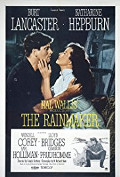
Directed by
Joseph Anthony
121 minutes
Rated PG
Reviewed by
Bernard Hemingway


Rainmaker, The (1956)
Although played with the ebullience of a stage musical, an impression added to by its widescreen Vistavision format and large studio-bound setting there is not a song to be heard (although Alex North’s score was nominated for an Oscar) in this story of a dreamer-come-snake-oil merchant Bill Starbuck (Burt Lancaster) who arrives in the small drought-striken town of Three Point, Kansas during the Great Depression where he meets the Curry family, H. C. Curry (Cameron Prud’homme), his sons Noah and Jim (Lloyd Bridges and Earl Holliman) and spinster daughter, Lizzie (Katharine Hepburn). Starbuck not only promises to bring rain to their farm, he sweeps Lizzie off her feet. But is he anything more than a con artist?
Richard Nash’s stage play (he also wrote the script) neatly explores the age-old subjective-objective chestnut that addresses the issue of whether the world as it is or how we see it, are we mere spectators in the unfolding of events or do we make those events? Probably the great achievement of the film is that it (rightly doesn’t come down on one side or the other but opts for something of each side with a bit of happenstance thrown in for good measure. To the empiricist Noah, Starbucks is a smooth talker and an out-and-out charlatan. To H.C. he’s at least offering some hope. And to Lizzie he makes her feel different, certainly much better than Noah does.
The cast play their stereotypical roles with gusto, Lancaster giving one of the most over-the-top performances of his career (he revisited the type in Elmer Gantry in 1960) and Hepburn, although no kind of cornpoke is winning in her role as a quietly desperate spinster. The pair of them are very much the fulcrum and substance of the film. Earl Holliman hams it up something shocking as the dumb gee-schucks yokel and Wendell Corey rounds out the roster as the square who is willing to take a run at Lizzie.
Today audiences may well question the core concern with Lizzie’s looks/sexual attractiveness and her final choice between her suitors but as a parable the film still has relevance.
FYI: There was a 1963 musical version called '110 In The Shade' also directed by Joseph Anthony.
Want something different?





